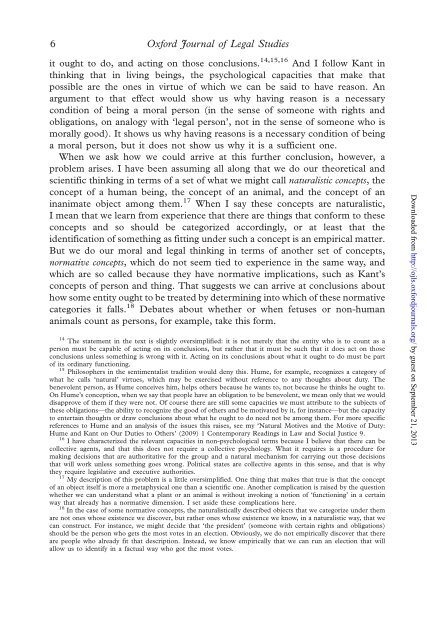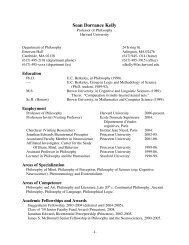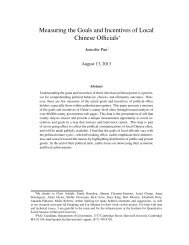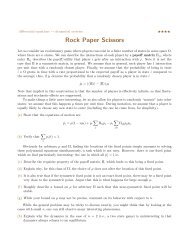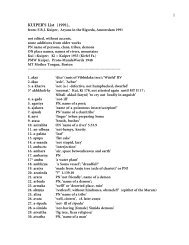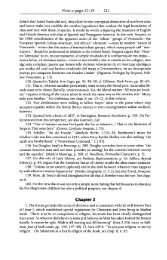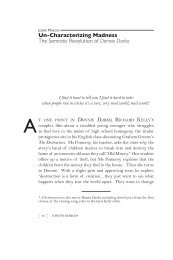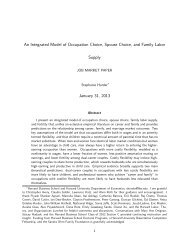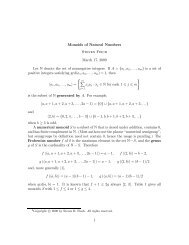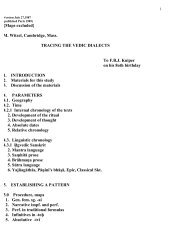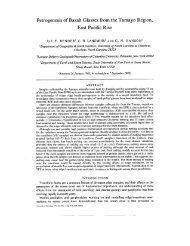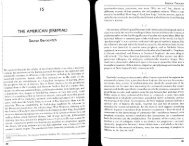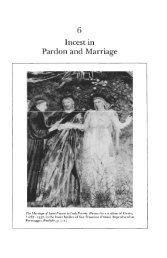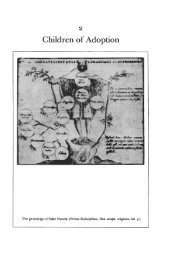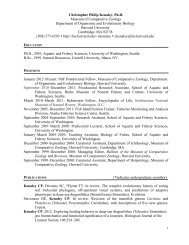Kantian Ethics, Animals, and the Law - People.fas.harvard.edu
Kantian Ethics, Animals, and the Law - People.fas.harvard.edu
Kantian Ethics, Animals, and the Law - People.fas.harvard.edu
You also want an ePaper? Increase the reach of your titles
YUMPU automatically turns print PDFs into web optimized ePapers that Google loves.
6 Oxford Journal of Legal Studies<br />
it ought to do, <strong>and</strong> acting on those conclusions. 14,15,16 And I follow Kant in<br />
thinking that in living beings, <strong>the</strong> psychological capacities that make that<br />
possible are <strong>the</strong> ones in virtue of which we can be said to have reason. An<br />
argument to that effect would show us why having reason is a necessary<br />
condition of being a moral person (in <strong>the</strong> sense of someone with rights <strong>and</strong><br />
obligations, on analogy with ‘legal person’, not in <strong>the</strong> sense of someone who is<br />
morally good). It shows us why having reasons is a necessary condition of being<br />
a moral person, but it does not show us why it is a sufficient one.<br />
When we ask how we could arrive at this fur<strong>the</strong>r conclusion, however, a<br />
problem arises. I have been assuming all along that we do our <strong>the</strong>oretical <strong>and</strong><br />
scientific thinking in terms of a set of what we might call naturalistic concepts, <strong>the</strong><br />
concept of a human being, <strong>the</strong> concept of an animal, <strong>and</strong> <strong>the</strong> concept of an<br />
inanimate object among <strong>the</strong>m. 17 When I say <strong>the</strong>se concepts are naturalistic,<br />
I mean that we learn from experience that <strong>the</strong>re are things that conform to <strong>the</strong>se<br />
concepts <strong>and</strong> so should be categorized accordingly, or at least that <strong>the</strong><br />
identification of something as fitting under such a concept is an empirical matter.<br />
But we do our moral <strong>and</strong> legal thinking in terms of ano<strong>the</strong>r set of concepts,<br />
normative concepts, which do not seem tied to experience in <strong>the</strong> same way, <strong>and</strong><br />
which are so called because <strong>the</strong>y have normative implications, such as Kant’s<br />
concepts of person <strong>and</strong> thing. That suggests we can arrive at conclusions about<br />
how some entity ought to be treated by determining into which of <strong>the</strong>se normative<br />
categories it falls. 18 Debates about whe<strong>the</strong>r or when fetuses or non-human<br />
animals count as persons, for example, take this form.<br />
14 The statement in <strong>the</strong> text is slightly oversimplified: it is not merely that <strong>the</strong> entity who is to count as a<br />
person must be capable of acting on its conclusions, but ra<strong>the</strong>r that it must be such that it does act on those<br />
conclusions unless something is wrong with it. Acting on its conclusions about what it ought to do must be part<br />
of its ordinary functioning.<br />
15 Philosophers in <strong>the</strong> sentimentalist tradition would deny this. Hume, for example, recognizes a category of<br />
what he calls ‘natural’ virtues, which may be exercised without reference to any thoughts about duty. The<br />
benevolent person, as Hume conceives him, helps o<strong>the</strong>rs because he wants to, not because he thinks he ought to.<br />
On Hume’s conception, when we say that people have an obligation to be benevolent, we mean only that we would<br />
disapprove of <strong>the</strong>m if <strong>the</strong>y were not. Of course <strong>the</strong>re are still some capacities we must attribute to <strong>the</strong> subjects of<br />
<strong>the</strong>se obligations—<strong>the</strong> ability to recognize <strong>the</strong> good of o<strong>the</strong>rs <strong>and</strong> be motivated by it, for instance—but <strong>the</strong> capacity<br />
to entertain thoughts or draw conclusions about what he ought to do need not be among <strong>the</strong>m. For more specific<br />
references to Hume <strong>and</strong> an analysis of <strong>the</strong> issues this raises, see my ‘Natural Motives <strong>and</strong> <strong>the</strong> Motive of Duty:<br />
Hume <strong>and</strong> Kant on Our Duties to O<strong>the</strong>rs’ (2009) 1 Contemporary Readings in <strong>Law</strong> <strong>and</strong> Social Justice 9.<br />
16 I have characterized <strong>the</strong> relevant capacities in non-psychological terms because I believe that <strong>the</strong>re can be<br />
collective agents, <strong>and</strong> that this does not require a collective psychology. What it requires is a proc<strong>edu</strong>re for<br />
making decisions that are authoritative for <strong>the</strong> group <strong>and</strong> a natural mechanism for carrying out those decisions<br />
that will work unless something goes wrong. Political states are collective agents in this sense, <strong>and</strong> that is why<br />
<strong>the</strong>y require legislative <strong>and</strong> executive authorities.<br />
17 My description of this problem is a little oversimplified. One thing that makes that true is that <strong>the</strong> concept<br />
of an object itself is more a metaphysical one than a scientific one. Ano<strong>the</strong>r complication is raised by <strong>the</strong> question<br />
whe<strong>the</strong>r we can underst<strong>and</strong> what a plant or an animal is without invoking a notion of ‘functioning’ in a certain<br />
way that already has a normative dimension. I set aside <strong>the</strong>se complications here.<br />
18 In <strong>the</strong> case of some normative concepts, <strong>the</strong> naturalistically described objects that we categorize under <strong>the</strong>m<br />
are not ones whose existence we discover, but ra<strong>the</strong>r ones whose existence we know, in a naturalistic way, that we<br />
can construct. For instance, we might decide that ‘<strong>the</strong> president’ (someone with certain rights <strong>and</strong> obligations)<br />
should be <strong>the</strong> person who gets <strong>the</strong> most votes in an election. Obviously, we do not empirically discover that <strong>the</strong>re<br />
are people who already fit that description. Instead, we know empirically that we can run an election that will<br />
allow us to identify in a factual way who got <strong>the</strong> most votes.<br />
Downloaded from http://ojls.oxfordjournals.org/ by guest on September 21, 2013


